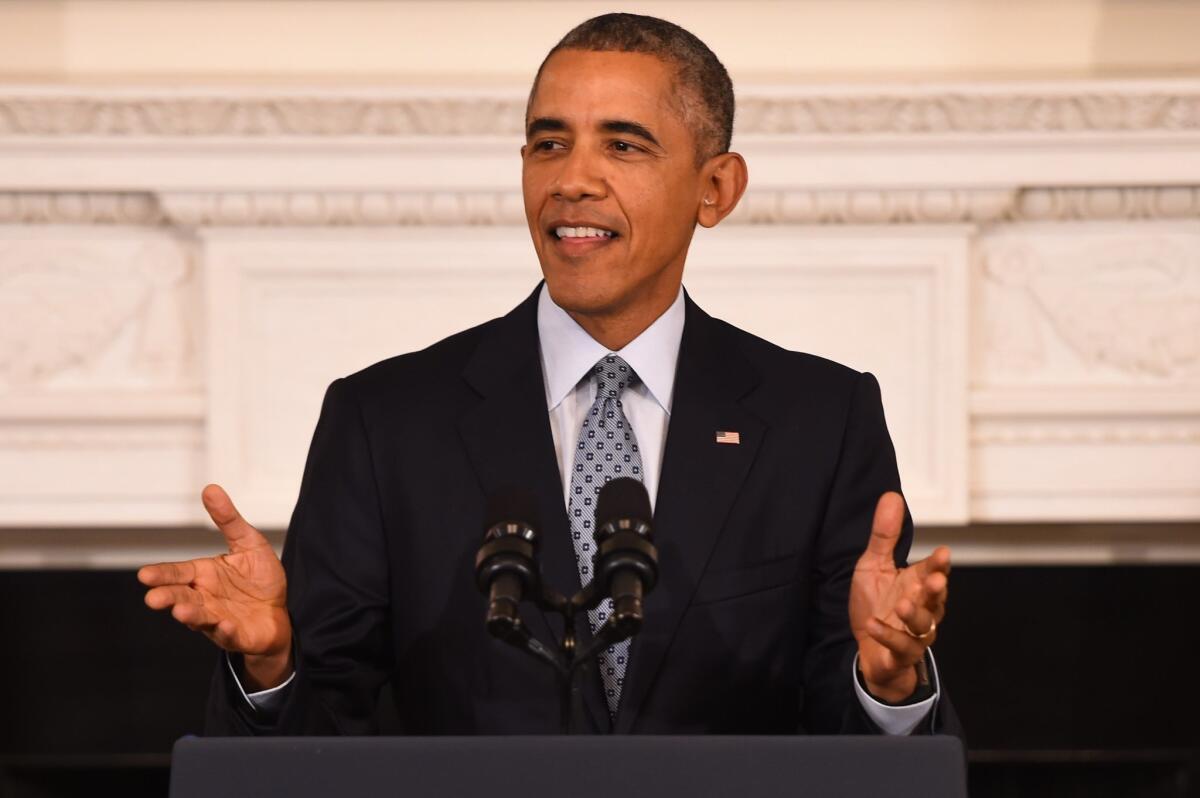Column: Why Obama prefers politicizing to actual politics

President Obama, speaking during a press conference at the White House last week, said that failure to act on gun control is a ‘political decision.’
- Share via
President Obama was right. He was right when, just a few hours after the horrible shooting in Oregon, he decried the fact that such slaughters have become “routine.” He was even right, in a sense, when he defended politicizing the tragedy.
“Of course,” Obama said Thursday night, “what’s also routine is that somebody, somewhere, will comment and say, ‘Obama politicized this issue.’ Well, this is something we should politicize. It is relevant to our common life together, to the body politic.”
This was a nice Aristotelian flourish. “Man is a political animal,” Aristotle said, and it is through politics that we decide how we should all live together.
But ultimately Obama was just paying lip service to an ideal he does not live by. He’s not about to try building consensus on gun violence among people of good faith. He’ll take the same approach he’s taken throughout his presidency: I mean he’ll delegitimize opponents of his sweeping agenda as irrational, self-interested, enemies of decency and progress.
As the Washington Examiner’s Byron York recently noted, Obama has a long history of trying to shut down disagreement by accusing his critics of politicization. He accused Republicans of trying to politicize abortion, the U.S. relationship with Israel, the Iran deal, Benghazi and the scandals at the IRS and the VA. Just last week he insinuated that Hillary Rodham Clinton’s disagreements with his Syria policy (or lack thereof) are influenced by the fact she’s running for office.
The common denominator in all of these cases is Obama’s unimpeachable certainty that he has a monopoly on all the good arguments and all the best motives. Now he even claims the exclusive right to politicize issues when it suits him.
In his remarks, he repeatedly insisted that all he wants are common-sense reforms that would stop mass shootings, as if the people who disagree with him are in favor of such slaughter. “And what’s become routine, of course, is the response of those who oppose any kind of common-sense gun legislation,” he lamented.
“We know that other countries, in response to one mass shooting, have been able to craft laws that almost eliminate mass shootings,” Obama said. “Friends of ours, allies of ours — Great Britain, Australia, countries like ours. So we know there are ways to prevent it.”
The disingenuousness was breathtaking.
One can forgive the average American, not to mention the typical White House correspondent, for not knowing how Britain and Australia dealt with gun violence. But Obama knows. Both countries employed massive gun confiscation programs (programs that depend on national gun registries so the government can find them). The British in effect banned handguns. Obama may consider that a reasonable, common-sense, approach, but he knows full well that millions of Americans don’t.
Obama’s comments on Thursday highlighted the problem with his approach to politics. He would rather go for everything he wants and get nothing, but keep the political issue, than make progress on common ground.
Virtually none of the proposals on his gun-control wish list — more comprehensive federal background checks, closing the gun show “loophole,” etc. — would help bring down the homicide rate. It’s not just a tautology to note that most gun crimes are committed by criminals — with guns bought illegally. Enforcing existing laws or restoring stop-and-frisk policies in big cities would save more lives than shuttering gun shows.
Nor would his proposals have prevented the deaths at Umpqua Community College. Typically, mass killers don’t buy guns at gun shows. And a CNN analysis found that a comprehensive background check system wouldn’t have prevented any of the “routine” killing sprees Obama referred to, save one: The Virginia Tech shooter should have failed a background test but didn’t.
That murderer — like the Tucson, Sandy Hook and, most likely, Umpqua killers — had serious mental health problems.
After the Sandy Hook slaughter, there was a bipartisan consensus that more needed to be done on the mental health side. But Obama, fresh off reelection, rejected a piecemeal approach, largely preferring to go for a “comprehensive” solution. He ended up with nothing at all.
Follow the Opinion section on Twitter @latimesopinion and Facebook
A cure for the common opinion
Get thought-provoking perspectives with our weekly newsletter.
You may occasionally receive promotional content from the Los Angeles Times.







